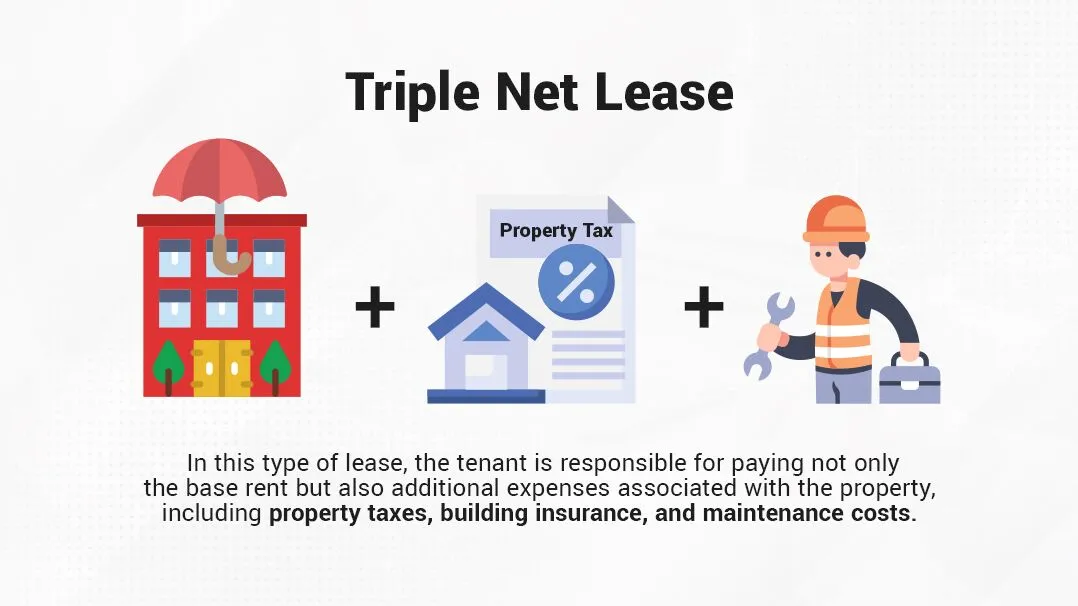
Introduction:
In the realm of commercial real estate, Triple Net Lease (NNN) is a significant term frequently encountered by investors, landlords, and tenants alike. Understanding its intricacies is crucial for anyone involved in commercial property transactions. This article aims to elucidate what a Triple Net Lease entails, its components, benefits, and considerations.
What is a Triple Net Lease (NNN)?
A Triple Net Lease, often abbreviated as NNN, is a type of lease agreement commonly utilized in commercial real estate transactions. Unlike traditional lease agreements where the landlord bears the burden of certain expenses, in a Triple Net Lease, the tenant assumes responsibility for most, if not all, operating costs associated with the property.
Components of a Triple Net Lease:
- Base Rent: Like any lease agreement, a Triple Net Lease includes a base rent amount. This is the fixed sum paid by the tenant to the landlord for the right to use the property.
- Operating Expenses: In addition to the base rent, the tenant agrees to pay all or a portion of the property’s operating expenses, which typically include property taxes, insurance premiums, and maintenance costs. These expenses are known as the “three nets” in Triple Net Lease, hence the name.
- Property Maintenance: Unlike other lease agreements, where the landlord is responsible for property maintenance, in a Triple Net Lease, the tenant often takes on this responsibility. This can include routine maintenance tasks such as landscaping, repairs, and utilities.
Benefits of Triple Net Lease for Landlords:
- Predictable Income: With tenants responsible for most operating expenses, landlords can enjoy a more predictable income stream as they only need to worry about receiving the base rent.
- Reduced Management Responsibility: Since tenants are responsible for property maintenance and operating expenses, landlords can minimize their involvement in day-to-day property management tasks.
- Lower Risk: Triple Net Leases can offer landlords a lower risk profile since tenants assume a significant portion of the property-related expenses, reducing the landlord’s exposure to fluctuations in operating costs.
Benefits of Triple Net Lease for Tenants:
- Control Over Property: Tenants have more control over the property’s operations and maintenance, allowing them to customize the space to suit their business needs without relying on the landlord’s approval for every change.
- Cost Transparency: Since tenants are responsible for paying operating expenses directly, they have a clear understanding of the total cost of occupying the space, making budgeting and financial planning easier.
- Long-Term Stability: Triple Net Leases often have longer lease terms, providing tenants with stability and security for their business operations.
Considerations for Both Parties:
- Creditworthiness of Tenant: Landlords should conduct thorough due diligence to assess the creditworthiness of potential tenants, especially since Triple Net Leases typically involve longer lease terms.
- Property Condition and Location: Tenants should carefully evaluate the condition and location of the property to ensure it aligns with their business needs and goals.
- Negotiation Flexibility: Both parties should negotiate the terms of the Triple Net Lease carefully, considering factors such as rent escalation clauses, responsibility for major repairs, and subleasing rights.
Conclusion:
Triple Net Lease (NNN) is a significant aspect of commercial real estate, offering benefits and considerations for both landlords and tenants. Understanding its components and implications is essential for making informed decisions in commercial property transactions. Whether you’re a landlord seeking stable income or a tenant looking for control and transparency, Triple Net Leases present opportunities worth exploring in the dynamic landscape of commercial real estate.
FAQ’s:
- What is a Triple Net Lease (NNN)?
A: A Triple Net Lease (NNN) is a type of lease agreement in commercial real estate where the tenant agrees to pay for property taxes, insurance, and maintenance costs in addition to the base rent. This type of lease shifts most of the operating expenses from the landlord to the tenant.
- What are the key components of a Triple Net Lease?
A: The key components include:
- Base Rent: The fixed amount paid by the tenant to the landlord.
- Property Taxes: The tenant is responsible for paying property taxes assessed on the leased property.
- Insurance: The tenant must obtain and maintain insurance coverage for the leased property.
- Maintenance Costs: The tenant is responsible for all maintenance and repair costs associated with the property.
- Who typically benefits from a Triple Net Lease?
A: Landlords typically benefit from Triple Net Leases as they transfer most of the property expenses to the tenant. Tenants may also benefit if the lease terms are favorable and the property is well-maintained.
- What types of properties commonly use Triple Net Leases?
A: Triple Net Leases are commonly used for commercial properties such as retail buildings, office buildings, industrial properties, and freestanding single-tenant properties like fast-food restaurants, pharmacies, and banks.
- What are the advantages of Triple Net Leases?
A: For landlords: Stable income with fewer operating expenses, lower management responsibilities, and potentially higher returns.
- For tenants: Control over the property’s operations, flexibility in customizing the space, and potentially lower rental rates compared to gross leases.
- What are the risks associated with Triple Net Leases?
A: For landlords: Vacancy risk, as finding new tenants can be challenging in some markets. Also, the landlord may still be responsible for major structural repairs and replacements.
- For tenants: Potential for increasing expenses over time, such as property tax hikes or rising insurance premiums, which could affect profitability.
- Are Triple Net Leases negotiable?
A: Yes, Triple Net Leases are negotiable, and the terms can vary depending on factors such as the strength of the tenant, the condition of the property, and market conditions.
- How are Triple Net Leases different from Gross Leases?
A: In a Gross Lease, the landlord typically pays for all property expenses, including taxes, insurance, and maintenance, while the tenant pays a fixed rent. In contrast, Triple Net Leases require the tenant to pay these additional expenses on top of the base rent.
- What should tenants consider before signing a Triple Net Lease?
A: Tenants should carefully review the lease terms, including the allocation of expenses, responsibilities for repairs and maintenance, lease duration, renewal options, and any clauses related to rent increases.
- How does the lease term affect Triple Net Leases?
A: The lease term, including the duration and any renewal options, can significantly impact both landlords and tenants. Longer lease terms may provide more stability and potentially lower rental rates, while shorter terms offer more flexibility but may come with higher rents or less favorable terms.







